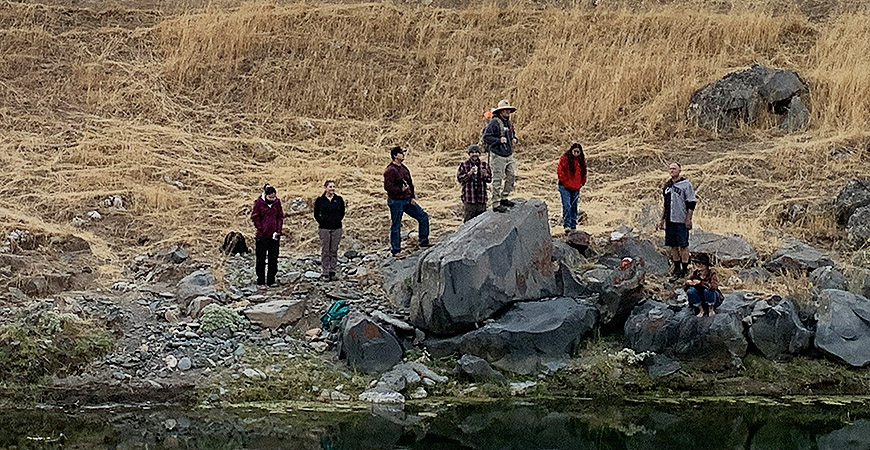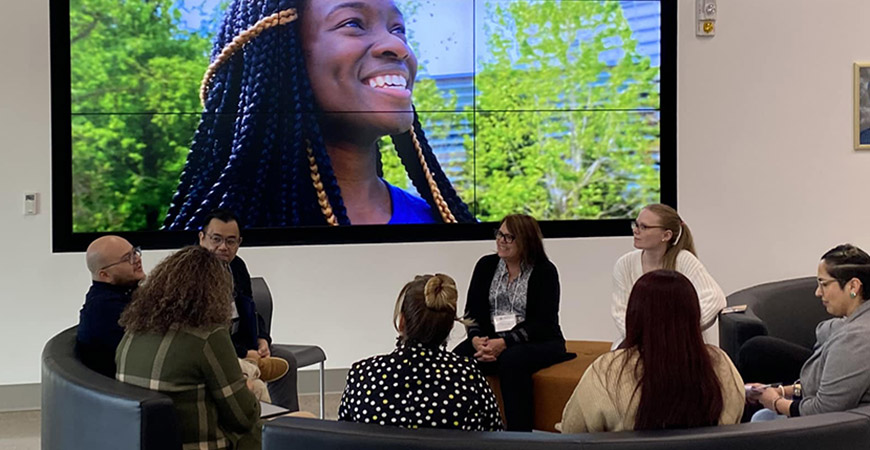
Humanities education has been under fire on college campuses over the past decade.
“There’s a lot of concern nationally about graduate education in the humanities. We’re producing plenty of Ph.D.s but are there enough jobs for them upon graduation?” said anthropology and heritage studies Professor Robin DeLugan, who leads UC Merced’s Research Center for Community Engaged Scholarship (ReCCES).
“How do we make a humanities career more feasible?”
That was the impetus for DeLugan and others to begin redefining humanities at UC Merced.
The Henry Luce Foundation, which funds projects focused on supporting humanities graduate education and research, noticed UC Merced’s interdisciplinary humanities faculty were doing something unique in their eight research areas — anthropology, critical race and ethnic studies, global arts, history, languages, literature, world heritage and writing studies.
“The difference is not that we have an interdisciplinary humanities program, but it's unique for graduate education programs in the humanities to be interdisciplinary and also integrate community-engaged research into the training,” DeLugan said. “What we're doing is innovative; we’re reimagining the future of humanities and the university by training grad students and supporting humanities faculty who collaborate with community partners on research projects.”

The Luce Foundation initially funded a $50,000 one-year planning grant in 2016, followed by a $280,000 grant for graduate students and faculty to conduct community-engaged research projects. That support evolved into more than a $1 million investment from the foundation to help further transform humanities graduate education at UC Merced. This gift is co-directed by DeLugan and Anne Zanzucchi, in support of humanities community-engaged projects in a team-based model.
With Luce’s support, DeLugan said, “everyone can see humanities in a fresh way.”
By bringing community-engaged research into the humanities, graduate students and faculty who typically work alone are learning how to collaborate in a team with community members.
“It makes humanities scholars think about what they do differently. Historians tend to work in the archives; they're not often working with community partners or community-initiated projects,” DeLugan said. “Literature folks often have their noses in books and they're not necessarily out in the field thinking about how to make a connection between literature and community issues.
“Our grad students are learning how to work across subfields and methods, and they're building their skills as academic scholars and future members of the professoriate,” DeLugan said. “By working in teams and with community collaborators — like local government, local nonprofits, local museums, libraries, etc. — they learn about other potential career paths.”
What we're doing is innovative; we’re reimagining the future of humanities and the university by training grad students and supporting humanities faculty who collaborate with community partners on research projects.
The Luce Foundation grant has helped fund faculty-led summer projects for the past six years and a two-day Summer Institute for Community Engaged Scholarship for four years. Eight graduate fellowships per year have been awarded to students working on faculty-led summer research.
The 2023-24 academic year projects include:
- “From the Past to the Present: Exploring Linguistic Landscape and Language Diversity in Merced” with professors Yiran Xu and Jiajun Liang; graduate fellows Joy Omeiza, Genevieve Egbunno and Savion Ellis; and Merced County Courthouse Museum Director Sarah Lim.
- “Rock Art Heritage Preservation Project: Democratizing Rock Art in the Metaverse (II)” with Professor Holley Moyes; graduate fellows Miriam Campos-Martinez, Angela Roberts, Omowumi Omole and Emilie Cobb; and the American Indian Council of Mariposa County. This is a continuation of the previous year’s project with graduate fellows Scott Nicolay, Miriam Campos Martinez, Emilie Cobb and Graham Goodwin.
This is Campos-Martinez’s second year working with Moyes collaborating with the Southern Sierra Miwuk Nation in recording rock art sites in Mariposa County.
“We started recording this site to protect a digital copy of the petroglyphs. There are about 150 motifs on rocks,” said Campos-Martnez, a sixth-year interdisciplinary humanities Ph.D. student. “We use different imaging methods to create the best reconstruction of the site, so if someone wants to study and research it in the future the information will be available.”
She said the experience and techniques she has learned during the project will benefit her thesis research in Mexico and in the future.
Through the Luce initiative, workshops and events to support interdisciplinary humanities graduate students are scheduled each semester.
A recent workshop with Emily Lin, director of strategic initiatives, archives and special collections for the UC Merced Library, was on planning research. At that workshop, Fernando Alvarez with the Office of Research and Economic Development talked about memorandums of understanding and UC policy.
A recent event during Research Week at the Merced Multicultural Arts Center featured Luce and other community research projects. Another event featured graduate student Nicolette Lecy developed an educator workshop series “Bringing Oral History into the Classroom" and featured local middle and high school oral history projects in collaboration with local educators at the Bloss Home’s spring open house.
Current funding from the Luce Foundation ends in 2025, when, DeLugan said, ReCCES will collaborate with the UC Merced Center for Humanities so the research can continue.
“We've been doing a lot of good work; it overlaps nicely with the university's commitment to do community-engaged research,” DeLugan said.



